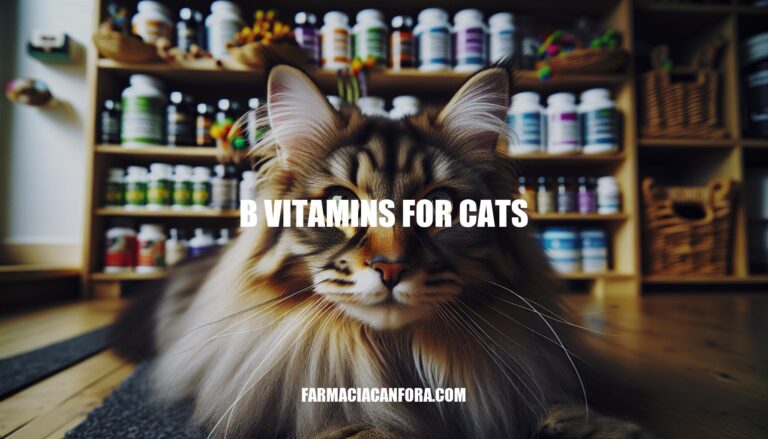


B vitamins are essential for cats, playing a crucial role in their overall health and well-being. These vitamins support metabolic processes, aid in nervous system function, and help maintain healthy skin and coat. Ensuring your cat gets enough B vitamins can boost their immune system, enhance energy levels, and promote overall vitality.
Here are the different types of B vitamins essential for cats:
Here are the specific health benefits of B vitamins for cats:
Metabolism Support: B vitamins, such as B1 (thiamine), B2 (riboflavin), B3 (niacin), B5 (pantothenic acid), B6 (pyridoxine), and B7 (biotin), play crucial roles in metabolizing fats, proteins, and carbohydrates, ensuring your cat gets the energy it needs.
Nervous System Function: Vitamins B1, B6, B9 (folic acid), and B12 (cobalamin) are essential for maintaining healthy nerve function and cognitive health. They help in the formation of neurotransmitters and support overall brain health.
Overall Vitality: B vitamins contribute to the production of red blood cells, which carry oxygen throughout the body, enhancing your cat’s energy levels and vitality. They also support a healthy immune system, skin, and coat.
These vitamins are vital for your cat’s overall health and well-being. If you have any concerns about your cat’s diet or health, it’s always best to consult with your veterinarian.
Cats can obtain B vitamins from various natural dietary sourcesMeat is a primary source, with muscle meat providing B3 and B5, and organ meats like liver and kidneys being rich in B2, B5, B7, B9, and B12Liver is particularly beneficial, offering a wide range of B vitamins.
Certain vegetables can also contribute, though cats are obligate carnivores and rely more on animal sources. For example, small amounts of vegetables like spinach and peas can provide some B vitamins.
In some cases, supplementation might be necessary, especially for cats with specific health conditions like chronic kidney disease or gastrointestinal issues that impair nutrient absorption. Supplements can help ensure they receive adequate B vitamins to support their overall health.
A deficiency of B vitamins in cats can lead to several health issues:
If you notice any of these symptoms in your cat, it’s best to consult a veterinarian for proper diagnosis and treatment.
Here’s a concise guide on safely supplementing B vitamins for cats:
Consult a Veterinarian: Always consult your vet before starting any supplement to ensure it’s necessary and safe for your cat.
Dosage Recommendations:
Administration:
Monitor for Side Effects: Watch for any adverse reactions and report them to your vet immediately.
Regular Check-ups: Regular vet visits to monitor your cat’s health and adjust dosages if necessary.
Always prioritize your cat’s health and safety by working closely with your veterinarian.
B vitamins are essential for cats, supporting metabolic processes, nervous system function, and overall health. Ensuring your cat gets enough B vitamins can boost their immune system, enhance energy levels, and promote vitality.
Cats can obtain B vitamins from meat, particularly liver, which is rich in various B vitamins. Vegetables like spinach and peas also provide some B vitamins, but cats rely more on animal sources. In some cases, supplementation might be necessary for cats with specific health conditions.
A deficiency of B vitamins can lead to lethargy, poor coat condition, neurological problems, gastrointestinal issues, and weight loss. If you notice any symptoms in your cat, consult a veterinarian for proper diagnosis and treatment. Always consult a veterinarian before starting any supplement to ensure it’s necessary and safe for your cat.